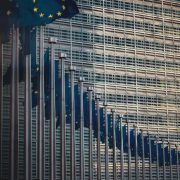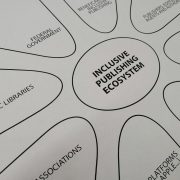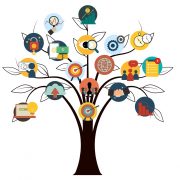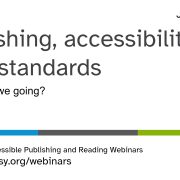Inclusion Promised as the Default Publishing Standard in Australia
This article was kindly submitted by Greg Alchin, Inclusive Design Specialist and Accessibility Advocate in the Australian Publishing industry.
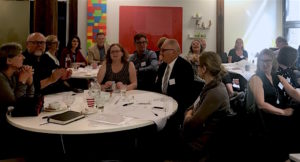 On the 2nd November 2017, the Australian Publishing Association (APA) hosted the “Marrakesh Treaty Forum II”. This Forum brings together representatives of the publishing industry, authors, libraries, copyright, disability associations, government and accessible format providers for a far-reaching exchange of information and ideas to progress the Marrakesh Treaty’s implementation in Australia. Australia was an early signatory to the
On the 2nd November 2017, the Australian Publishing Association (APA) hosted the “Marrakesh Treaty Forum II”. This Forum brings together representatives of the publishing industry, authors, libraries, copyright, disability associations, government and accessible format providers for a far-reaching exchange of information and ideas to progress the Marrakesh Treaty’s implementation in Australia. Australia was an early signatory to the
treaty which encourages governments to allow books to be converted to accessible formats without having to obtain permission from copyright owners every time.
The purpose of the Forum is to identify the key challenges in ensuring that published material is accessible to the print disabled and to identify the pathways to address those challenges. The 2017 Forum saw updates on industry projects to advance not only the implementation of the Marrakesh Treaty but to move to a default model of inclusive publishing where equity of experience is available for all.
The Business Case
A clear appreciation of the need for inclusive publishing was impressed upon participants and agreed to. Understanding the demographics of disability within the market makes good business sense. For many their understanding of disability is based upon a misconception that disability is just a personal health attribute. It is embedded in the stereotypical images of people in wheelchairs, deafness and blindness. It may be caused by accident, trauma, genetics or disease. It may also be total or partial, lifelong or acquired, visible or invisible.
A more nuanced understanding of disability has developed in recent years. Disability is no longer seen as just a personal attribute or health experience. Disability is context dependent. It is, as the World Health Organisation states, “a complex phenomenon, reflecting the interaction between features of a person’s body and features of the society in which he or she lives.” What this means, is that disability happens at the points of interaction between a person and the context in which they find themselves. Mismatched interactions result in a loss of ability to participate and interact and result in exclusion. Consider the following examples:
- Individuals with an ear infection may experience a temporary hearing disability.
- The environment of a noisy bar or hotel may result in patrons experiencing a situational hearing disability when they try to interact and be understood over background noise.
- Individuals with a wrist injury / broken arm have a temporary physical disability.
- New parents attempting to complete tasks whilst holding an infant experience a situational physical disability
Being mindful of the continuum from permanent to situational disabilities helps us to reconsider the number of people who experience disability on a daily basis. The benefits of designing publications that are “Born Accessible” from the start are undeniable.
The Legal Position in Australia
Furthermore, there is a range of international mandates and national legislation that supports the case for “Born Accessible” content. Equal access to information in Australia is:
- a right under the both the United Nations Convention on the Rights of Persons with Disabilities and the Marrakesh Treaty to Facilitate Access to Published Works for Persons Who Are Blind, Visually Impaired or Otherwise Print Disabled.
- a requirement by law under Australia’s Disability Discrimination Act, and Disability Standards for Education.
- a procurement standard under Australian Standard AS EN 301 549:2016 which relates to accessibility requirements suitable for public procurement of ICT products and services. This includes digital books and digital reading systems.
- a professional standard for educators under the Australian Professional Standards for Teachers (See 1.5, 1.6, 2.6, 3.4, 4.1 and 7.2).
It is important to note that all of the above legislative and professional requirements either directly or indirectly reference the W3C’s technology neutral Web Content Accessibility Guidelines (WCAG 2.0).
Inclusive Publishing as the Default Publishing Standard
There was a lot of genuine good will and positive energy in the room from all parties. The forum agreed inclusion should be the default publishing standard in Australia and that by no later than December 2021 there will be:
- high community and business awareness of the value of accessible content
- seamless discoverability of accessible formats
- inclusion as the default standard
- Full implementation of accessibility standards by APA members
- equitable and sustainable economic model
Next Steps
The Forum agreed to progress the following projects over the next 12 months in order to achieve these exciting new objectives:
- accessibility fields to be agreed for both Title Page (the industry look up service) and Trove (the repository run but the National Library of Australia).
- copyright guidelines to be finalised, made widely available and training to be underway
- publish a plain English guide to accessibility standards
- APA to inform publishers about accessibility standards
- APA publishers to review workflow practices and how to implement accessibility
- develop a shared messaging on “inclusive by design” and “equity of reading experience”
Chief executive of the Australian Publishers’ Association Michael Smith-Gordon added his support commenting that making content accessible at the outset made better economic sense than ”retro fitting” books once published with digital add-ons.
Editors note: Thanks to Greg Alchin for this article. We look forward to seeing how things progress with this ground-breaking initiative.
Linda Morris of The Sydney Morning Herald has written Book of the Future is a choose-your-own-adventure on events at the forum in Australia.
Australian ABC Radio broadcast this interview on the Marrakesh Treaty on the 4th of December 2017.
If you have an Inclusive Publishing story to share, feel free to contact us.



